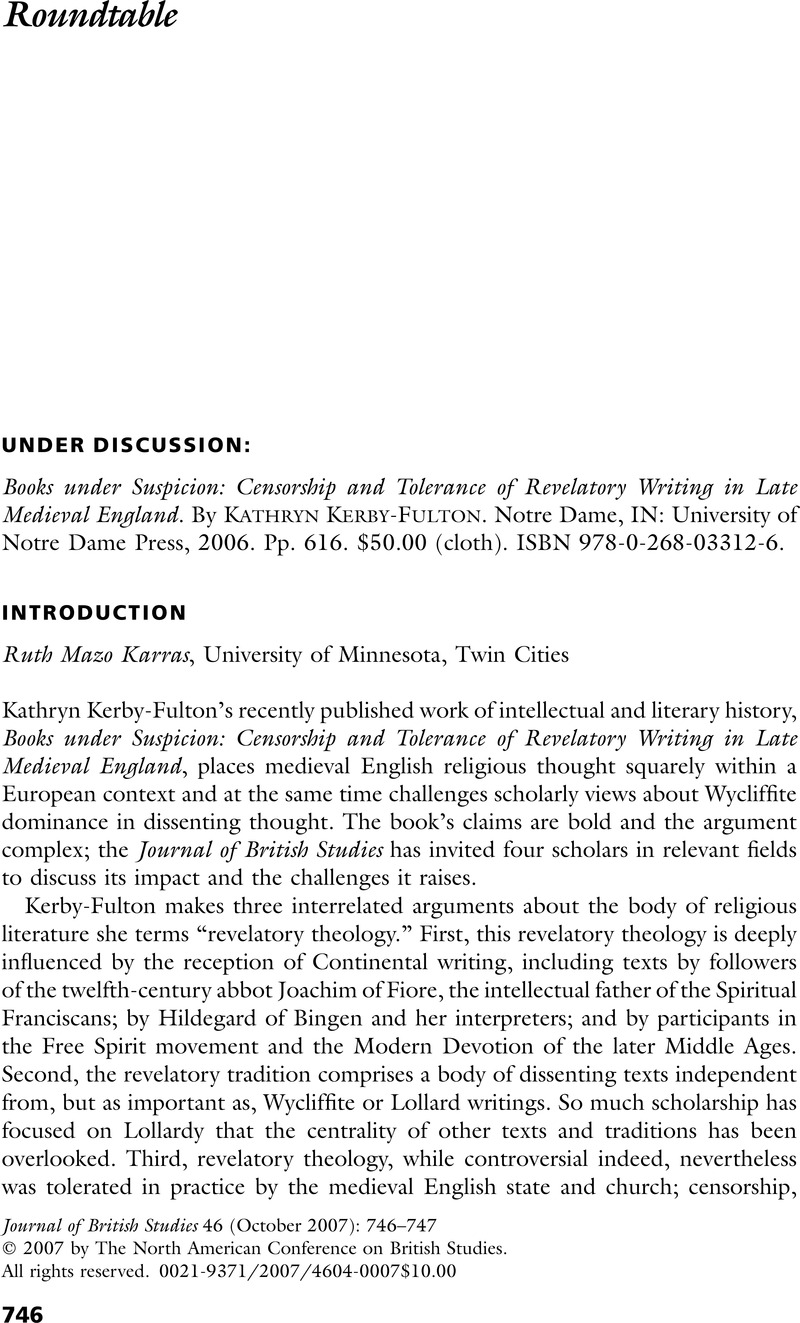Article contents
Books under Suspicion: Censorship and Tolerance of Revelatory Writing in Late Medieval England. Response: Books under Suspicion and Beyond
Published online by Cambridge University Press: 21 December 2012
Abstract

- Type
- Roundtable: Books under Suspicion: Censorship and Tolerance of Revelatory Writing in Late Medieval England. By Kathryn Kerby-Fulton
- Information
- Copyright
- Copyright © North American Conference of British Studies 2007
References
1 Hudson writes: “Much less persuasive, it seems to me, is the attempt to argue that revelatory writing and the notions it purveyed were more widely disseminated than the ideas of the Wycliffite movement and attracted as much censorship” (759). This is not what my book argues. Elsewhere she writes that I claim that revelatory writing “derived from Joachim of Flore [sic] or … pertaining to the Free Spirit ‘sect,’ was a familiar form” (759). I am not certain what she means by “familiar” (this is the kind of term I might use of, say, Boethius, not Joachim of Fiore), but this is not an accurate account of the book either.
2 Cited from Hogg, James, The Syon Additions for the Sisters from the British Library MS Arundel 146 (Salzburg, 1978), 15Google Scholar.
3 See my forthcoming “Joachimism and the Jews in Late Medieval England,” with a full list of Joachite manuscripts in England, in the festschrift for Sheila Delaney, Florilegium: The Journal of the Canadian Society of Medievalists (2007). See also Kerby-Fulton, Kathryn, “English Joachimism and Its Codicological Context: A List of Joachite Manuscripts of English Origin or Provenance before 1600,” in Essays in Memory of Majorie Reeves, ed. Wannenmacher, Julia (London, forthcoming).Google Scholar
4 Borthwick Institute, University of York, Reg. 23, fol. 202.
5 Todd, Dorothea, “Christina of Markyate's Biographer and His Work” (PhD diss., University of Victoria, 2004)Google Scholar.
6 See Kerby-Fulton, Kathryn and Justice, Steven, “Reformist Intellectual Culture in the English and Irish Civil Service: The Modus Tenendi Parliamentum and Its Literary Relations,” Traditio 53 (1998): 149–203CrossRefGoogle Scholar, plate 2 for a reproduction of the image and 186 n. 108 for the contents of the records filed under it.
7 Only Crowley's third edition contains the variant “Dauie” for “Dawe” (making him, that is, “Davey the Digger”).
8 For the most recent account, see Coote, Leslie, Prophecy and Public Affairs in Late Medieval England (Woodbridge, 2000), 84–89Google Scholar.
9 Theophilus on Diverse Arts, trans. Hawthorne, J. and Smith, C. (New York, 1979)Google Scholar.
10 Cited in Gilbert, Creighton, “A Statement of Aesthetic Attitude around 1230,” Hebrew University Studies in Literature and the Arts 13 (1985): 136Google Scholar. See also Binski, Paul, Becket's Crown: Art and Imagination in Gothic England: 1170–1300 (New Haven, CT, 2004), 201–6Google Scholar.
11 Hanna, Ralph, “Dr. Peter Partridge and MS Digby 98,” in Text and Controversy from Wyclif to Bale: Essays in Honour of Anne Hudson, ed. Barr, Helen and Hutchinson, Anne (Turnhout, 2005), 51Google Scholar. Hanna points out that the table of contents remains intact and wonders whether this means a colleague of Partridge made the excision, though surely any excisor would have been dependent on the table of contents, too, to navigate this complex anthology.
12 See Wehrli-Johns, Martina, “Mystik und Inquisition: Die Dominikaner und die sogennante des Freien Geistes,” in Deutche Mystik, ed. Haug, Walter and Schneider-Lastin, W. (Tübingen, 2000), 145–87Google Scholar.
13 Justice, Steven, Writing and Rebellion: England in 1381 (Berkeley, 1994), 5Google Scholar.
- 6
- Cited by




